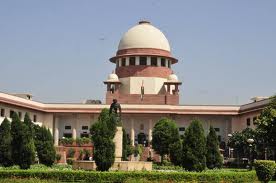
New Delhi, April 17: A woman who was forced into marriage as a minor and suffered years of abuse before obtaining a divorce and qualifying for the Madhya Pradesh state civil service has petitioned Supreme Court that a law to discourage child marriage is being used unfairly to deny her a job.
Responding to Ratnarashi Pandey's plea, the Supre8me Court on Monday issued notice to the MP government on her challenging the validity of a rule that says people who marry as minors are debarred from appointment in the civil services.
Ratnarashi was married at the age of 14 and the marriage, marked by physical and mental cruelty, ended 13 years later when she got a divorce. As she got no maintenance from her husband and had to bring up two children, she cleared the state civil services exams only to be told that her marriage as minor disqualified her from a state government job.
She has challenged the legal validity of rule 6(5) of MP Civil Services (general condition of service) Rules, 1961, as despite the odds against her, Ratnarashi cleared the examination twice but was rejected because of her marriage over which she had no control.
Appearing before a bench of Justices Aftab Alam and Ranjana P Desai, Ratnarashi's counsel Neela Gokhale said her client should not be punished for being married off by her parents when she was a minor. The bench issued notice to the state and directed it to keep one post vacant till further orders.
Rule 6(5), inserted into the MP law on March 10, 2005, says, "No candidate shall be eligible for appointment to a service or post who has married before the minimum age fixed for marriage. The minimum age of marriage for a boy is 21 years while that for a girl is 18 years."
Since Ratnarashi got married when she was 14, she was refused appointment to MP civil services although she argued that she was a victim rather than an offender.
The high court dismissed her petition and justified the provision saying Rule 6(5) had been introduced to prevent child marriages more effectively as various laws to eradicate the social evil had not yielded results.
Gokhale said the high court, while dismissing Pandey's petition, ignored welfare legislations in favour of children, which warranted a holistic approach towards this peculiar problem.
"Rule of law does not contemplate any punishment or disqualification of a child who is a victim of such child marriage practice and in fact, even the Declaration of Human Rights of the Child by United Nations specifically declares that any child in conflict of law shall not suffer any disqualification in his career and shall be supported by the state to reform himself as a law abiding citizen," she said.
Ratnarashi said although she was a victim of the deplorable practice of child marriage in her society, she was being denied an opportunity to live with dignity and respect by earning her livelihood through an appointment in state civil services for which she is eligible and has cleared necessary screening tests.
Times View
This appears to be a clear case of a well-intentioned law becoming counterproductive when mechanically applied. The idea of discouraging child marriage is undoubtedly correct. However, as the woman in this specific case is pointing out, she can hardly be blamed for the fact that she was married off at14. Common sense dictates that she should be viewed as a victim rather than as someone who is practicing a social evil. She was a minor when she got married and was in no position to object effectively. To punish her for that would be to compound the injustice done to her. If anything, she is to be admired for rising from such a situation to be able to successfully compete in the civil service exams.





Comments
Add new comment